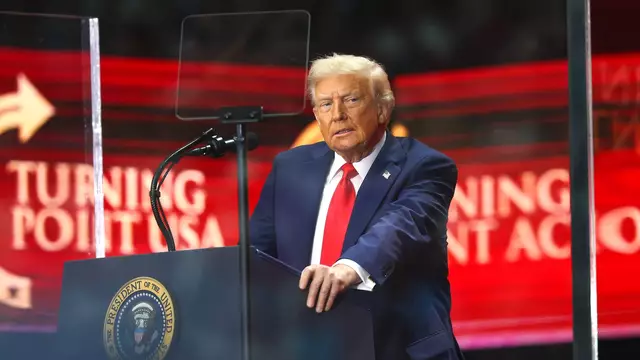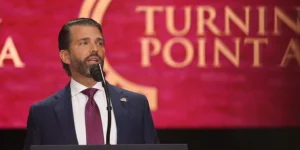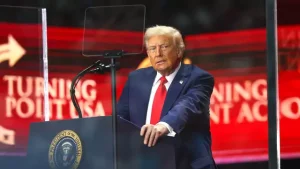At what was meant to be a solemn gathering to honor slain activist Charlie Kirk, former President Donald Trump stunned mourners with an unexpected announcement that quickly drew national attention.
Speaking before tens of thousands at State Farm Stadium in Glendale, Arizona, Trump paused his tribute to the 31-year-old founder of Turning Point USA to unveil what he described as a historic breakthrough in the fight against autism.
“You know what ‘MAHA’ is? Make America Healthy Again,” Trump declared, turning his famous campaign slogan into a new rallying cry. “I think you’re going to find it to be amazing. I think we found an answer to autism, how about that?”
The moment, which came during one of the largest political memorials in recent history, immediately ignited debate across social media, the medical community, and Washington — not only about the substance of Trump’s claim but about the appropriateness of the venue.
A Bold Claim Amid Mourning
Kirk, a vocal Trump ally and rising figure in conservative politics, was fatally shot on September 10 while speaking at Utah Valley University. His death shocked the MAGA movement, drawing high-profile figures — including Trump, Vice President J.D. Vance, and dozens of lawmakers — to Arizona for the memorial service.
Trump’s speech began as a personal tribute, praising Kirk for “helping unite MAGA” and inspiring younger conservatives. But then he shifted gears, teasing what he called “one of the biggest announcements in the history of the country.”
“We’re going to be talking in the Oval Office about autism, how it happens,” Trump said. “So, we won’t let it happen anymore, and how to get at least somewhat better when you have it, so that parents can help their child.”
According to both Politico and The Washington Post, the Trump administration is expected to reveal on Monday that Tylenol use during pregnancy may contribute to autism diagnoses in children. Officials are also preparing to discuss the drug leucovorin as a possible treatment.
Immediate Backlash
The reaction online was swift and harsh.
-
“During a funeral??????” one user asked.
-
Another posted: “Imagine turning your friend’s funeral into your own personal rally.”
-
A third called the moment “so dystopian.”
Even some of Trump’s allies reportedly expressed concern privately, worried that the announcement overshadowed Kirk’s memory and risked politicizing an already emotional gathering.
https://twitter.com/Acyn/status/1969895124609200258
Pushback From Medical Experts
The claim linking acetaminophen (Tylenol) to autism has circulated for years, but major health organizations have consistently rejected it.
Pharmaceutical giant Kenvue, which manufactures Tylenol, issued a firm rebuttal.
“Acetaminophen is the safest pain reliever option for pregnant women as needed throughout their entire pregnancy,” the company said. “Over a decade of rigorous research, endorsed by leading medical professionals and global health regulators, confirms there is no credible evidence linking acetaminophen to autism.”
The Centers for Disease Control and Prevention (CDC) has also emphasized that vaccines and common medications are not associated with autism. “To date, the studies continue to show that vaccines are not associated with autism,” the agency has repeatedly stated.
Autism advocacy groups also reacted with frustration. “Families deserve hope grounded in science, not politics,” said a spokesperson for the Autism Society of America. “Announcements like these risk spreading misinformation and increasing stigma.”
RFK Jr.’s Role
Much of the controversy centers on Trump’s new Health Secretary, Robert F. Kennedy Jr., who has long been a polarizing figure. Known for his anti-vaccine activism and unproven claims about environmental causes of autism, RFK Jr. has spent years promoting what experts call “junk science.”
At Kirk’s memorial, RFK Jr. echoed Trump’s optimism, pledging that the administration was “on the verge of answers.”
Back in April, Kennedy told Trump’s Cabinet:
“At your direction, we are going to know by September. We’ve launched a massive testing and research effort that’s going to involve hundreds of scientists from around the world.”
Now, he insists that the administration will fulfill that promise.
But mainstream scientists argue that rising autism diagnoses have more to do with expanded definitions of the condition, improved awareness, and better diagnostic tools — not a sudden new environmental trigger.
Trump’s History of Health Announcements
This is not the first time Trump has made a major health-related declaration outside traditional channels.
-
In 2020, he touted hydroxychloroquine as a COVID-19 treatment despite limited evidence.
-
Later, he floated the idea of injecting disinfectants — a remark that drew ridicule and condemnation from health experts.
-
More recently, he has questioned the safety of vaccines, aligning himself with RFK Jr.’s skepticism.
Critics argue that Sunday’s autism claim follows a familiar pattern: headline-grabbing statements that energize supporters but alarm the medical establishment.
Political Implications
The announcement also has political overtones. By making the claim at Kirk’s funeral, Trump tied the supposed breakthrough to the conservative movement’s narrative of fighting for “forgotten families.”
Republicans have long accused Democrats of ignoring parents struggling with autism care. By promising an “answer” to autism, Trump positioned himself as the champion of those families — even if the science is shaky.
Democrats, however, blasted the move as irresponsible. “Weaponizing grief for political gain is beneath the office,” said Rep. Jamie Raskin, D-Md. “Families affected by autism deserve evidence-based solutions, not campaign slogans.”
Families Left in the Middle
For parents raising children with autism, the announcement was both confusing and frustrating. Some expressed cautious hope that new treatments might emerge. Others worried it would rekindle harmful myths about vaccines and maternal health choices.
“Every time a leader makes a sweeping statement, it filters down to classrooms, playgrounds, and doctor’s offices,” said Dr. Emily Han, a developmental pediatrician in Los Angeles. “We see the consequences — more stigma, more blame placed on mothers, and more mistrust in the medical system.”
The Larger Context
The autism debate has intensified in recent decades as diagnoses in the U.S. have climbed. In 2000, about 1 in 150 children was diagnosed; today, it’s closer to 1 in 36, according to the CDC.
Experts say this rise is due largely to:
-
Expanded diagnostic criteria.
-
Greater awareness among parents and educators.
-
Increased access to screenings and services.
Despite decades of research, no single cause has been identified. Most scientists believe autism results from a combination of genetic predispositions and environmental factors, not one drug or exposure.
Conclusion
Charlie Kirk’s funeral was meant to unify conservatives mourning a young leader taken too soon. Instead, it became a flashpoint for one of the most contentious debates in American public life.
Trump’s surprise autism claim — whether seen as bold leadership or reckless opportunism — has already overshadowed the memorial and set the stage for Monday’s high-profile press conference at the White House.
For families, scientists, and policymakers, the question remains: will the announcement mark a genuine breakthrough, or another chapter in America’s long battle over science, politics, and trust?

James Jenkins is a celebrated Pulitzer Prize-winning author whose work has reshaped the way readers think about social justice and human rights in America. Raised in Atlanta, Georgia, James grew up in a community that instilled in him both resilience and a strong sense of responsibility toward others. After studying political science and creative writing at Howard University, he worked as a journalist covering civil rights issues before dedicating himself fully to fiction. His novels are known for their sharp, empathetic portraits of marginalized communities and for weaving personal stories with broader political realities. Jenkins’s breakout novel, Shadows of Freedom, won national acclaim for its unflinching look at systemic inequality, while his more recent works explore themes of identity, resilience, and the fight for dignity in the face of oppression. Beyond his novels, James is an active public speaker, lecturing at universities and participating in nonprofit initiatives that support literacy and community empowerment. He believes that storytelling is a way to preserve history and inspire change. When not writing, James enjoys jazz music, mentoring young writers, and traveling with his family to explore cultures and stories around the world.









